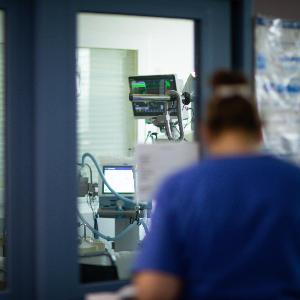
© IMAGO / Leonhard Simon
From the very beginning, the SARS-CoV-2 pandemic has presented healthcare professionals with huge challenges. Initially, coping with the sudden influx of Covid-19 patients, restructuring the LMU Medical Center to ensure continuity of services for other patients, and the planning of research projects to learn more about the disease itself were the most urgent tasks. Much of the burden during this period fell on the shoulders of junior researchers at LMU, who have since put in a tremendous amount of work and accomplished a great deal.
This evening, three of them will talk about their work during the pandemic. The clinical course of COVID-19 has turned out to be extraordinarily variable. Many of those infected either show mild symptoms or none at all, while others develop severe disease and require intensive care. The range of manifestations greatly complicated the responses of clinicians and researchers alike, and forced them to confront a series of difficult questions.
What sections of the population are at greatest risk? Are there factors which protect against COVID-19? How can particularly serious cases be rapidly recognized as such? Dr. Johannes C. Hellmuth will describe the contribution that the LMU Medical Center has made to the understanding of COVID-19, and report on the national networks that have been set up to deal with the many and varied repercussions of the pandemic. Dr. med. Johannes C. Hellmuth is an assistant physician and clinical researcher in Medical Clinic III at the LMU Medical Center. In addition to pursuing his own research, he is the Coordinator of the LMU Medical Center’s COVID-19 Registry (CORKUM) and Spokesperson for the LMU Task Force in the University Medicine Network (NUM).
What impact has the COVID-19 pandemic had on the care of cancer patients in a large Oncological Hospital? And what additional risks does COVID-19 entail for cancer patients and immunosuppressed patients generally? In her lecture, Dr. Elham Khatamzas will report on the observations she has made on immunosuppressed patients infected with the virus, and on patients who have recovered from SARS-CoV-2 infections. Dr. Dr. med. Elham Khatamzas, a specialist in infectious diseases, works in the Clinic of Hematology and Oncology at the LMU Medical Center. She is particularly interested in the complications that arise when immunosuppressed patients contract an infectious disease.
The social isolation and loneliness associated with the pandemic pose problems for the general population. But they are especially stressful for individuals with psychological illnesses. Those who work in the health services are also exposed to an unusual combination of stress factors. These include longer working hours, difficult decisions on triage, frustration and exhaustion – all of which present potential threats to their own mental health. This in turn raises a number of important issues. How are individuals with psychological illnesses coping with the additional stresses associated with the pandemic? How serious are the levels of stress to which staff in the health services are currently exposed? Can a simple but accurate predictive model be developed that enables them to assess their own levels of psychological stress and choose the best form of intervention? PD Dr. med. Kristina Adorjan is a psychiatrist in the Clinic of Psychiatry and Psychotherapy at the LMU Medical Center. Her research interests focus on the biological origins of psychological illness and the environmental factors that promote its development, in particular in Germany and Africa.
Prof. Dr. med. Oliver T. Keppler, Professor of Virology and Chief Executive of LMU‘s Max von Pettenkofer Institute, will chair the session.
The event will be held in German.
Please abide by LMU's Terms of Use, including the relevant Restrictions on Data Sharing and the Data Protection Regulations in relation to Zoom. In addition, please take note of the Information on Registration, Access and Use (PDF, 178 KB) of the Webinar function in the context of the LMU Corona Lectures.
